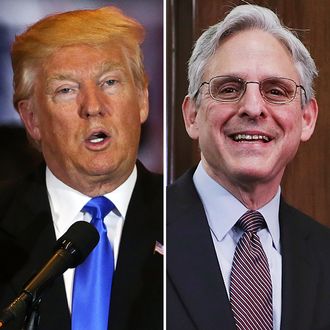
It’s a bad day to be Ron Johnson. Or Kelly Ayotte. Or any other swing-state Republican senator up for reelection this fall.
Last night in Indiana, Donald Trump became the most unpopular major-party nominee in American history. A CNN/ORC poll released Wednesday shows Clinton leading Trump nationally 54 to 41 percent. The survey finds that 64 percent of women say they dislike the Donald, while 73 percent of nonwhites, 57 percent of moderates, and 37 percent of conservatives say the same. One poll last month showed a majority of white men saying they don’t care for the walking, talking caricature of patriarchal privilege.
After glimpsing such numbers, many Republicans have concluded that the party should focus on preventing down-ballot candidates from drowning in a great blue wave this fall. But it’s not clear exactly how the GOP should go about doing that. The intuitive answer would be to localize the races, and give Ron Johnson license to run against — or at least away from — Trump in Wisconsin. But if a large swath of the party distances itself from the standard-bearer, they could end up dampening Republican turnout and guaranteeing Clinton the kind of landslide that would sweep Rob Portman into the dustbin of history. Democratic strategist Simon Rosenberg salivates at this possibility, imagining the contrast between a Democratic Party united behind Clinton — herself flanked by two popular ex-presidents — and “an unpopular, isolated Trump.”
Thus, down-ballot Republicans face a pair of bad options: embrace Trump and pray that high turnout among Hillary-hating conservatives compensates for the backlash that six months of Trump’s misogynistic ravings are bound to produce, or run away from him and pray that moderates turn out to vote for divided government.
Thanks to Merrick Garland, Senate Republicans will have little time to choose.
The RedState blog, a right-wing fever swamp turned bastion of principled anti-Trumpism, argued Wednesday that the GOP should “confirm Merrick Garland ASAP,” writing:
Republicans must know that there is absolutely no chance that we will win the White House in 2016 now … So the choices, essentially, are to confirm Garland and have another bite at the apple in a decade, or watch as President Clinton nominates someone who is radically more leftist and 10-15 years younger, and we are in no position to stop it.
In recent days, President Obama has taken the Garland fight to vulnerable Republican senators’ backyards. On Monday, Obama made his case for a hearing on Garland’s nomination to journalists from Ayotte’s New Hampshire, Johnson’s Wisconsin, John McCain’s Arizona, Roy Blunt’s Missouri, Rob Portman’s Ohio, and Chuck Grassley’s Iowa, The Atlantic reports.
Recent polls show that a majority of Americans believe Garland deserves a hearing. A new PPP survey of Ohio found 65 percent of voters saying that Obama’s pick merits formal consideration. Granted, there probably isn’t a human being in America (with the possible exception of Garland himself) whose main concern when selecting a senator is whether or not he or she will hold hearings whenever they’re appropriate. But with Trump at the top of the ticket, swing-state Republicans will want to assure voters that the GOP is not a radical party. It will be difficult for Portman to do that while refusing to recognize the president’s constitutional right to appoint Supreme Court justices.
And yet, at this point, honoring Garland’s nomination comes with its own risks. The Republican caucus has spent months arguing that America has the right to weigh in on the next Supreme Court nominee via its choice in the November election. If they back away from that stance now, they would effectively rebuke their own presidential nominee. And if hearings build popular support for Garland’s confirmation, they would be forced into either defying the will of the general public or that of their own base.
Thus, how Republicans proceed on Garland may serve as a leading indicator of whether the party is prepared to unify behind the Donald or else distance itself from him. If current polling holds up, they’ll be trumped if they do, trumped if they don’t.






























